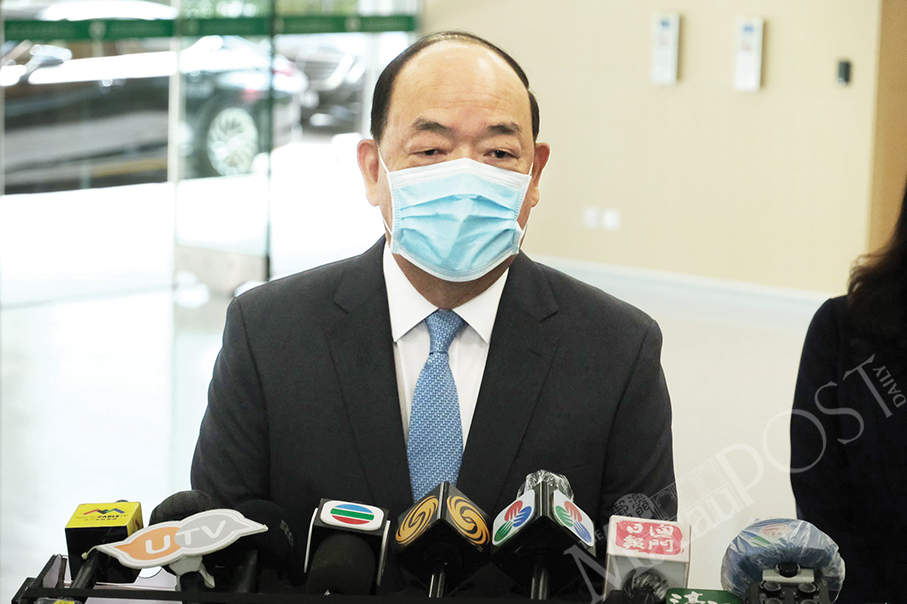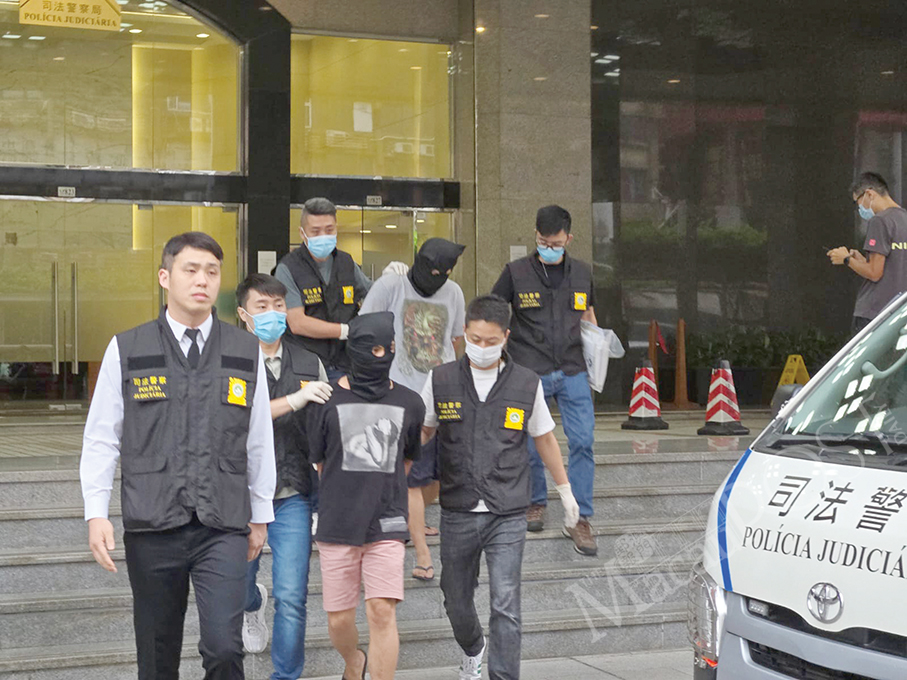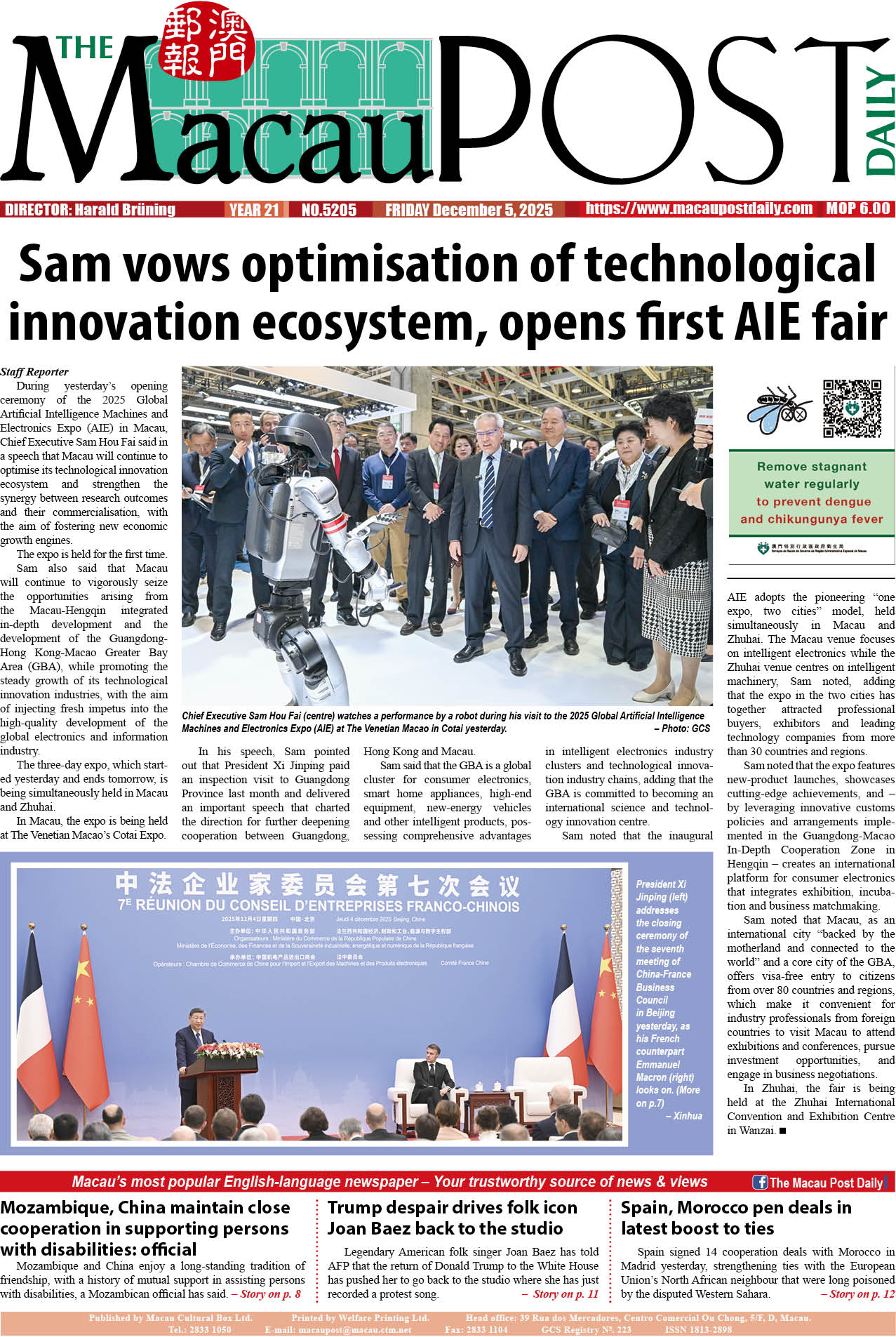Chief Executive Ho Iat Seng said yesterday that the local government will request the National Health Commission’s (NHC) permission for Macau to implement 10 days of hotel quarantine plus seven days of self-health management or monitoring for arrivals from countries and regions affected by COVID-19.
The chief executive said that he expects the “10+7” arrangement to get off the ground during the upcoming summer holiday period.
Ho made the remarks speaking to reporters after attending yesterday’s inauguration ceremony of the Seac Pai Van Health Centre in Coloane.
Currently, those arriving in Macau from a foreign country, Taiwan or Hong Kong must undergo 14 days of hotel quarantine plus seven days of self-health management or monitoring.
Those who have completed their 14-day hotel quarantine after arriving in Macau from a foreign country or Taiwan must practise seven days of self-health management, during which their Macau Health Code colour indicates yellow, which bars them from entering certain premises and facilities, using public transport, and entering the mainland from Macau.
Compared to arrivals from foreign countries or Taiwan, those who have completed their 14-day hotel quarantine after arriving in Macau from Hong Kong are currently subject to less strict post-quarantine measures, namely seven days of self-health monitoring, during which they have a green Macau Health Code but are still barred from entering the mainland from Macau.
In general, currently those arriving in the mainland from countries and regions affected by COVID-19 – i.e., all other countries and regions except Macau – must undergo 14 days of hotel quarantine plus seven days of self-health monitoring. However, the central government launched a pilot scheme earlier this year which chose a number of cities to implement only 10 days of hotel quarantine plus seven days of self-health monitoring for arrivals from COVID-19-affected countries and regions.
Speaking to reporters yesterday, Ho said that four cities in the mainland have been implementing the “10+7” model for around a month on a trial basis, adding that the mainland’s health authorities are currently assessing and reviewing the implementation of the new measure. The chief executive was quick to add that he believed that the “10+7” model would become the mainland’s “new trend”.
Ho pledged that after the mainland completes its assessment of the implementation of the new “10+7” model, the Macau government will ask the National Health Commission to grant Macau permission to also implement the “10+7” model for arrivals from COVID-19-affected countries and regions. He said he hoped that the new model could get off the ground during the summer holiday period.
The Macau government has reaffirmed that it will always carry out its COVID-19 measures in conjunction with the mainland.
Ho also said that he did not rule out the possibility of Macau being able to even implement a “7+7” model, i.e., seven days of hotel quarantine plus seven days of self-health management or monitoring.
Meanwhile, Ho also reaffirmed that the Macau government has never received any news concerning the possible implementation of quarantine-free travel arrangements between Macau and Hong Kong.
Japan wants Macau to lift hotel quarantine for its nationals
Meanwhile, Ho also revealed further details concerning Japan’s decision to classify Macau as a Yellow region denoting medium COVID-19 risk.
Japan will conditionally open its borders to foreign tourists from Friday, and has classified countries and regions worldwide in three different-risk groups, namely Red (highest risk), Yellow (medium risk), and Blue (lowest risk). Travellers from the three groups of countries and regions will be subject to different levels of COVID-19 measures upon arrival.
Regardless of having been vaccinated against COVID-19 or not, travellers from the Red group will need to undergo testing and quarantine upon arrival in Japan.
Travellers who have received three COVID-19 jabs from the Yellow group will not need to undergo quarantine upon arrival in Japan, but otherwise will have to quarantine.
Regardless of having been vaccinated or not, all travellers from the Blue group will not need to undergo quarantine upon arrival in Japan.
Japan’s authorities have classified mainland China, Hong Kong and Taiwan as Blue countries and regions, while Macau has been classified as a Yellow region.
Ho said yesterday that the Macau government has been in constant communication with its Japanese counterpart concerning the matter. He revealed that Japan has decided to classify Macau as a Yellow region with the “ultimate” objective of pushing the Macau government to lift its hotel quarantine requirements for Japanese people, which shows he said, that, Japan’s authorities have not made their travellers’ COVID-19 risk classifications solely in line with the respective countries and regions’ COVID-19 prevention and control performance.
Ho said it was unfair that Japan would only classify Macau as a Blue region if the Macau government lifts its hotel quarantine requirements for Japanese nationals.
Due to the COVID-19 pandemic, foreign nationals without a Macau ID card have, in general, been barred from entering Macau since March 2020, regardless of whether they are willing to undergo hotel quarantine.
Ho underlined that even though Macau has opened its borders to non-local Portuguese nationals since late last month, they must also be subject to the Macau government’s current requirement of 14 days in hotel quarantine upon their arrival here.
Govt to ‘surely’ adjust casino revenue forecast
Meanwhile, Ho also said that the government will “surely” adjust its forecast for this year’s gross gaming revenue (GGR) of 130 billion patacas. He acknowledged that Macau’s gaming industry has been hard hit by the economic impact of local COVID-19 transmissions in various areas in the mainland over the past few months.
Consequently, Ho said, the local government will submit another 2022 budget amendment bill to the Legislative Assembly (AL) in the second half of this year.
The legislature passed the government’s first budget amendment bill for this year in April.
Ho said that while a gradual increase in the number of visitors will help boost Macau’s economic recovery, for the longer-term Macau will need to strengthen its cooperation with Zhuhai to help with its appropriate economic diversification drive and boosting its participation in the development of the Guangdong-Macau In-depth Cooperation Zone in Hengqin.
Meanwhile, Ho also said that he did not know exactly how many “satellite casinos” have been or will be closed. But he was quick to add he understood that most of the existing “satellite casinos” would continue to operate.
Ho also said that “if not too many satellite casinos close, there won’t be a big problem concerning residents’ unemployment”.
Sea-crossing cable car
Meanwhile, Ho was also asked by reporters about the government’s proposal to build a sea-crossing cable car system between the southern tip of the Zone A land reclamation area and the Macau Science Centre in Nape, which is laid out in the draft of Macau’s land transport master plan for 2021-30, which is currently undergoing a public consultation process.
Ho said that he has read the master plan, which has been drafted by the Transport Bureau (DSAT). He noted that the purpose of a public consultation is to ask residents for their opinions as to whether certain proposals should go ahead.
Ho said that if residents in general think that a sea-crossing cable car system should not be built there, the government will simply drop the proposal, meaning that it will not be included in the final version of the land transport master plan for 2021-30. “This is a simple thing,” he said.

Chief Executive Ho Iat Seng speaks to reporters at the new Seac Pai Van Health Centre in Coloane yesterday. Photo: MPDG








